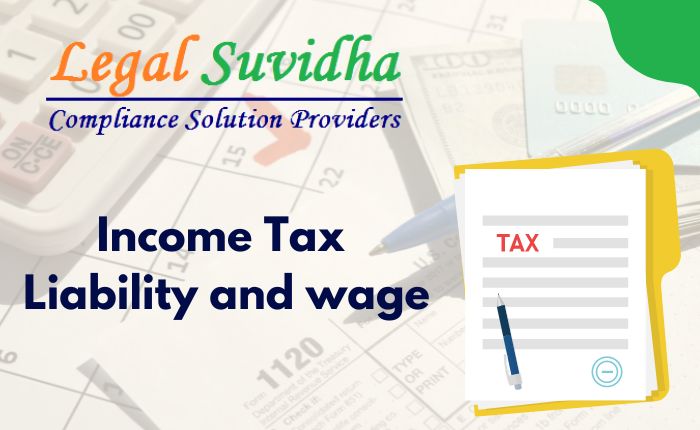Understanding Income Tax Liability and Wage
When it comes to income tax liability, it’s important to understand what constitutes wages. Wages refer to any compensation paid to an employee, including salaries, bonuses, and tips. It’s important to note that not all income is considered wages for tax purposes. For example, income from investments is not considered wages and is subject to different tax rules.
Calculating Income Tax Liability
To calculate income tax liability, you’ll need to consider several factors, including your taxable income, deductions, and credits. Taxable income is the amount of income you earn that is subject to taxes. Deductions can help reduce your taxable income and include items like mortgage interest, charitable contributions, and certain business expenses. Credits, on the other hand, are dollar-for-dollar reductions in your tax liability and can include things like the earned income credit and child tax credit.
Understanding Wage
Wage can vary depending on the industry and the specific job. Generally, wages are determined by an agreement between the employer and employee and can include things like hourly pay, salaries, and commissions. It’s important to note that some types of wages, such as tips and fringe benefits, may have different tax implications.
The new ‘wage’ definition and other changes to income tax laws have a number of implications for individuals and businesses. Some of the most important implications to be aware of include:
- Changes to taxable income – The new wage definition may result in changes to how taxable income is calculated. This could impact the amount of income subject to federal income tax, as well as other taxes like Social Security and Medicare.
- Changes to withholding – Employers may need to adjust their withholding practices to account for changes in the new wage definition. This could impact how much tax is withheld from employee paychecks and how much they owe at tax time.
- Changes to deductions – Changes to income tax laws could impact which deductions are available and how much can be deducted from taxable income. This could impact the overall tax liability of individuals and businesses.
- Compliance requirements – With changes to income tax laws, individuals and businesses may need to adjust their record-keeping and reporting practices to ensure compliance with new regulations. This could include changes to how income and expenses are reported, as well as changes to how tax returns are filed.
- Penalties and fines – Failure to comply with new income tax laws could result in penalties and fines. It’s important for individuals and businesses to stay up-to-date on changes to income tax laws and ensure they are in compliance to avoid costly penalties.
Overall, changes to income tax laws can have significant implications for individuals and businesses alike. It’s important to stay informed and seek professional guidance to ensure compliance and minimize tax liability.
Key point on Income tax liability and the new ‘wage’
- Taxable income: Taxable income includes all income subject to federal income tax, including wages, salaries, tips, interest, dividends, and capital gains.
- Tax deductions: Tax deductions can reduce taxable income and lower overall tax liability. Common deductions include mortgage interest, charitable contributions, and business expenses.
- Changes to the wage definition: The new ‘wage’ definition expands the scope of what is considered compensation for tax purposes, including bonuses, commissions, and fringe benefits.
- Withholding: Employers may need to adjust their withholding practices to account for changes in the new wage definition, which could impact the amount of tax withheld from employee paychecks.
- Compliance: Changes to income tax laws can impact compliance requirements, including record-keeping and reporting practices. Failure to comply with new regulations could result in penalties and fines.
- Professional guidance: It’s important to stay informed and seek professional guidance to ensure compliance and minimize tax liability.
Understanding income tax liability and the new ‘wage’ definition is crucial for individuals and businesses to navigate the complex world of taxation and compensation. By keeping these key points in mind, individuals and businesses can ensure compliance with tax laws and regulations and minimize their tax liability.
If You have any query then connect with us at [email protected] or you can contact us & stay updated with our latest blogs & articles.


![Received an Income Tax Notice in India? Don’t Panic — Here’s Exactly What to Do [2025 Guide] 1 Income Tax Notice](https://legalsuvidha.com/wp-content/uploads/2025/12/Income-Tax-Notice.png)
![Cyber Crime FIR in India: How to File Complaint for Online Fraud, Banking Fraud & Digital Harassment [2025 Guide] 2 Cyber Crime Complaint](https://legalsuvidha.com/wp-content/uploads/2025/12/Cyber-Crime-Complaint.png)
![Trademark Infringement in India: How to File Legal Action & Protect Your Brand [2025 Guide] 3 Tradenark Infrigement](https://legalsuvidha.com/wp-content/uploads/2025/12/Tradenark-Infrigement.png)
![Property Title Verification in India: How to Check Clear Title in 7 Steps [Avoid Property Fraud – 2025 Guide] 4 Property Titles Verification](https://legalsuvidha.com/wp-content/uploads/2025/12/Property-Titles-Verification.png)



